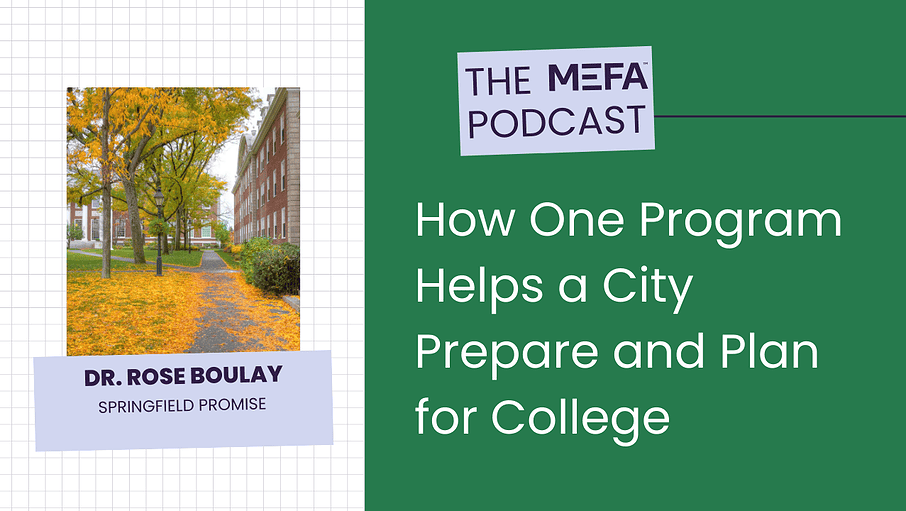

Resources Mentioned in this Episode
Dr. Rose Boulay: [00:00:00] The good thing about Springfield is we have a very rich culture and we are extremely diverse. We have approximately 26,000 school age students in the school system, about 4,000 employees in nearly 60 schools. So that’s a lot. But at the same time, I think our diversity is what makes us unique.
But at the same time, when you take other places like, for example, Boston, Chicago or Philadelphia, we are similar when it comes to the economic variables and the ups and downs that we have. So our goal is just to make sure that we’re providing inclusive learning communities for all of our [00:01:00] students, regardless of their family’s economic background, for example, social status or country of origin.
Jonathan Hughes: Hello everyone and welcome to the MEFA Podcast. My name is Jonathan Hughes and one of the great things about doing this show is that we get to highlight the people and resources. All across Massachusetts. And today we’re bringing our sights to Springfield, Massachusetts, home of Dr. Seuss, basketball, and our featured partner on the show today, the Springfield Promise Program.
We’re talking to Administrator Dr. Rose Boulay. About everything that the Springfield Promise Program does to educate Springfielders about the college financial aid process and how they assist students in finding ways to make a post secondary education attainable and affordable. Especially in the exciting [00:02:00] current environment.
But you’ll want to hear Dr. Boulay talk all about their work and everything that they do for students and families and schools in Springfield. So you’re really going to like meeting her, I think, as much as I did. So let’s get to that and I’ll be back afterwards with the wrap up.
Dr. Rose Boulay: Before I start, I first need to thank you for having me on your show today to talk about post secondary programs at Springfield Public Schools, especially as they relate to Springfield Promise Program.
It is an honor to be here. I am Rose Boulay. I’m the Springfield Commerce Program Administrator, and I came to the Springfield Public Schools from UMass Amherst with an extensive background working in college access programs college admission recruitment and retention family programming and also diversity programming.
So my priority has always been bringing awareness. [00:03:00] to post secondary education and college affordability and also its relevance to educational and economic growth and development. So I’m honored to serve SPS Springfield and Springfield students and families. And I’m eager to help them in whatever way that I can.
Jonathan Hughes: Thank you very much. The pleasure and the honor is certainly ours to have you with us. Can I ask what interested you about this line of work? How did you, it seems like something that, you clearly have a lot of passion for.
Dr. Rose Boulay: Yes, I do. I was I consider myself a minority students. I’m a first gen student. Also an immigrant student. I came here on a student visa all by myself. I’m trying to make it through college. So I understand what students are in families are going through and how hard the process [00:04:00] can be when you don’t have the guidance that you need. And that’s what that’s what drives me.
Through this work, just being, making sure that I can be of guidance to people and give them the knowledge, the information that they need so they can make the best choice for their lives.
Jonathan Hughes: So tell me about Springfield Promise and everybody else listening. Tell me about what Springfield Promise is and what you do and what you can offer the students of Springfield.
Dr. Rose Boulay: Oh, definitely. Thank you so much for asking that question as well. The sprinkler promise program supports SPS portrait of a graduate initiative that every student must graduate high school, ready for college and the career of their future. So as such we educate students.
Parents and guardians about the college financial aid process. That is, we assist them in finding ways to make a post secondary education attainable and affordable. And then we also support school [00:05:00] counseling staff to ensure that all students graduate with a plan. We don’t want anyone leaving the building not knowing exactly what they are going to do with their lives after high school graduation.
So we typically have five financial aid advisors in the schools five days a week. And some weekends when we have weekend activities and evening activities. And our role is to promote our services and working with students one on one and in groups on college affordability. So we help students complete the FAFSA CSS profile applications.
We review and and help them with the financial aid appeal process review their award letters and things like that. And then we’re also making sure that students apply for scholarships. We know that even if they’re on full payroll grant, for example, what they’re getting is not going to be enough for them to go to a four year college, or especially if it is an out of state school and things like that.
So we, we’re very [00:06:00] heavy as well in making sure that students apply for scholarships, especially local scholarships as well. We press, we help students with this quest bridge program, for example. And making sure that they have the same chance that everybody else is getting in terms of getting the information and being able to apply and being able to be eligible for those type of services in the summer as well.
We transition to summer melt to ensure that our students, they are ready for their first semester at college. So we help making sure that they’re. They register for or and attend orientation. They register for their classes. They’re completing their loan, counseling and promissory notes. They know how to pay their bills.
And then they’re also securing housing if this is what they need to do. And then. At the end, we talk, usually we talk about school supplies and things like that, but we make sure that the very basic things that they need [00:07:00] to know to get themselves ready for that first day of classes that they are aware of them and they’re taking care of those as well.
In addition, we also help with summer enrichment programs with 11th graders to give them a crash course on what to expect in the fall of their senior year. And also getting them started with a college application. We do college visits creating their FSA IDs giving them a crash course on the scholarship process, how to look for scholarships, myth and tips and things like that.
So there’s never a dull moment. I would say for our school counselors and then SP, SPP advisors. So we have, I would say we have an amazing staff and they work every day very hard to advocate for our students, the betterment of our schools, our students and families. So they are truly the heroes and she was and we are very grateful for the to be for them to be part of [00:08:00] our team and for us to be involved in their work.
Jonathan Hughes: As you hinted at, that is a lot of work to do. And from what I remember being out at the Springfield promise office, it’s a kind of a small group you have, right? So how do you do all that?
Dr. Rose Boulay: I wouldn’t say that. We do it by making sure that everyone is working together. The small group of stuff that we have, which is in total would be five financial aid advisers on. And we also have 1 percent volunteering for us right now at one school without the support of the counselors. The financial advisors would not be able to do their work again without the support of the principals in the building.
We wouldn’t be able to have access to the building and be able to work with families and do what we need to do. So it takes a team effort to be able to do what we do on a single, on a everyday basis.
Jonathan Hughes: Yeah. And so speaking about Springfield in particular of course, we know that every community, certainly every, [00:09:00] large community in Massachusetts has its own character.
And Springfield is the third largest city in Massachusetts and definitely has its own character. If you had to say some things that were unique about Springfield and about the student population there and how that presents in your job, what would you say?
Dr. Rose Boulay: I’m glad you made you mentioned that we are the third largest cities city in Massachusetts because we are but the good thing about Springfield is we have a very rich culture and we are extremely diverse.
We have approximately 26,000 school age students in the school system about 4,000 employees in nearly 60 schools. So that’s, that, that’s a lot but. At the same time. I think our diversity is what makes us unique. But at the same time, when you take order places like, for example, Boston, Chicago or Philadelphia, we are similar when it comes to the economic variables and the ups and downs that we have.
So our goal is just to make sure that we’re [00:10:00] providing inclusive, learning communities for all of our students, regardless of their family’s economic background, for example, social status or country of origin. And with the help of our community, we’re always working together to make sure our students are well educated, they are well trained.
And they are as prepared as any other school district just to make sure that they are, they can compete in our global economy and then the vibrant world that we have out there.
Jonathan Hughes: You spoke about the economic variables between and all sorts of variables between the various schools and communities in Springfield.
What are some of the key practices for those different types? How do you do what you need to do for the different types of institutions and populations?
Dr. Rose Boulay: Basically, what we do is we make sure that everyone is on the same page. The advisors, regardless of where [00:11:00] you are working. We have to make sure that there are certain tasks every student has to complete.
Whether us, whether, for example, we, a school has Naviance, for example, or don’t have Naviance, there are other ways for us to still get, for example, a student list. Or a list of tasks to make sure that the students are completing their task by having a Google sheet, for example, or an Excel spreadsheet and things like that.
So we make sure that regardless of the school that we’re in, our students, they are getting the same service. And then the other thing that we do is just make sure that we respect each school’s and their uniqueness. And then go with the flow and just make sure that we are working diligently and collaboratively with our students.
The principals of each schools, the counselors of each schools to make sure that we do what we need to do. But we do serve, like you said, not just SPS schools, but we also serve some of the charter schools [00:12:00] currently that have 11 or 12 grade classroom. And as long as they are moving up in their grade level.
We start communicating with them as well and make sure that everyone is getting the service. As you said earlier, we are a small staff, so no schools usually would have one person every single day. They probably would get one day a week or half a day a week, but then we do make sure that everyone is served.
Jonathan Hughes: Now, getting to this particular year, It’s been an eventful year as far as filing financial aid, at least is concerned and lots of different reasons. But and we’ve seen in general, of course, that FAFSA completion rates have gone down since the pandemic and it’s probably the same in Springfield. But this year, of course. As I mentioned, brings a whole other level of chaos to things. What have you been hearing this year from families and students?
Dr. Rose Boulay: I [00:13:00] would say instead of chaos, Jonathan, let’s say excitement.
Jonathan Hughes: That’s a better word to use.
Dr. Rose Boulay: Sure. But, you are right. We’ve been having some issues with first completion in the past. And I would say that since the pandemic. It has not been just Springfield public schools that have been having issues and low FAFSA completion. It was nationwide. And, but I would also say that last year we did see a small increase and we were very grateful for that small increase. And we plan as well to make sure that we continue to build on that increase so we can be where we were, for example, in 2019.
There’s no doubt that the. New in place. The implementation of the better faster has been anything but smooth. And it has created a lot of frustration for all involved, including school districts college and universities students and families. Yes, families have been having [00:14:00] issues specifically with creating their FSA IDs or logging into the system. The wait time, for example, as well for. For you to get an answer from FSA has been as long as 30 minutes. And sometimes after the 30 minutes you get you, they hang up on you. So these are some things that have been happening and we understand that.
And then we also have some instances where students they are unable to send. Invitation to the talk to a contributor. And things of that nature. But families have also been very pleased with the short amount of time it takes to actually complete a form compared to two previous years. So we know and we are confident that the Next year, for example, the FAFSA would be more efficient.
And then we also know, like I said earlier, it takes less than 15 minutes to complete in some cases. It is faster. And then the [00:15:00] completion would be more accurate. So those are huge pluses for all of us involved, especially our student population. The changes they were needed. But we just wish that the implementation was not was more successful.
So we’ve been we’ve been there. We are showing families that they’re not alone in the process. We’re making sure that we’re telling people to be patient that they still have time since the colleges have not been able to review to get their information either. And just and then we continue to share whatever information we have work arounds that the FSA is giving us and troubleshooting instances and things like that. We keep on communicating those with folks so that they know where we are. And then that it’s going to be done regardless. We know, for example, SPP, our community is very resilient. So we are confident that we’ll persist at the end and our students will head to [00:16:00] college or trade school this fall and receive the financial aid that they need and deserve.
Jonathan Hughes: Have there been any, given the exciting implementation of the FAFSA this year, have there been any sort of collaborations or any new strategies other than the ones you just mentioned? But I’m really wondering about collaborations with different agencies or businesses and local organizations.
Dr. Rose Boulay: Yes. What we did is we know that there was going to be, changes into the FAFSA. So in the summer what we did, we started going out there and talking to families. We participate, we went, we were at the parades, tabling at parades and things like that. Just to share information with folks.
We collaborated heavily with the schools around us. This time around the universities, they came in the winter, the first two months just to help us to complete as many fast as possible. We also collaborated with key gear up just to make sure that we [00:17:00] are getting students the information that they need.
But at the same time, we’re completing fast as now, we can’t tell you how many faxes have been completed because students have not been receiving their financial aids submission summaries yet. And those have not been tracked by the FAFSA tracker either at this time. But we know students are submitting their applications.
Jonathan Hughes: You mentioned summer melt earlier and I was wondering if you, if anybody heard it and didn’t know what summer melt was, if you could explain it. And then also, you mentioned all the things that you. as an organization do to help combat summer melt? Do you, how do you see that intensifying or not this year?
Dr. Rose Boulay: The, summer melt means that we call it is the process where students, at the end of the school year, they graduated, and then they decided at the end, okay, I’m not going to school anymore. And usually that happens because the student does not have the guidance that they need [00:18:00] to make sure that that they know what to expect.
They know what to do. They have a checklist. and things like that to make sure that they’re making it to the finish line. What our goal is to make sure we minimize or reduce the number of students that decided, I’m not going to college. I’m not going to trade school by the end of the summer.
So we see, so for us right now, we would be working with fixing, reviewing our letters, helping students to send appeal letters and helping students to make a decision. And then once they make a decision, send out their enrollment deposit letter, and then also actually log into their student accounts.
That’s what we would be doing at this time. So because that the FAFSA was delayed, we can’t do this at this time. And we anticipate that it could be July. And even early August that we’re still doing process and we’re prepared to do that because we know that is something that’s going to happen.
So we [00:19:00] will continue to work collaboratively with the community, the different stakeholders just to make sure that people understand what’s at stake, but at the same time, do what they need to do and we’re there to assist in any way that we can. So we will continue to do to do these things at the same time, What we’re doing is planning now for summer melt as well.
So that we have everything in place. Some things are going to probably happen at the simultaneous mostly, but that’s fine. But at least we know that we’re going to do what we need to do. It would not be the first time that we have to pivot or we had to revise a timeline or change perspective.
Yeah. Yeah, and that’s what I said that we are resilient community. We’ll do what we need to do is just might take more time than usual. And more support than usual to do it. But we’ll do what we have to do.
Jonathan Hughes: We’ve talked mostly about college so far, but you did mention career [00:20:00] training as well or kids moving from high school directly into a career.
Have you seen an uptick in students choosing that career? Rather than going to college. And if so, what do you think might be the reason for that?
Dr. Rose Boulay: In Springfield Public Schools, we support students decision to choose whatever plan that they want. We do understand that some students are going to college or trade school, and we will be there to help them.
We also know that some students are going. Straight into the workforce. And we understand that and we’ll make sure that they have a plan for that as well. And at the same time, we also have some students that might decide. Okay, I’m taking a year off. But then our questions to those students is.
What do you mean you’re taking a year off? What are you going to do during that year off? And make sure that we can guide them to whatever it is that that they [00:21:00] plan to do. We know that this is a, this is an issue for us, especially after the pandemic, where a lot of students were choosing to just take Go to work because so many employment opportunities were available.
And they were making good money. And they were choosing that path. But at the same time, our goal is just to make sure that the ones that are going to go to college, that we continue to promote the importance of it. Because we know for sure that having a college degree. Is it’s not the only path to success, but it is the surest path to success.
Economic success in life. So we continue to promote that and put that in front of the student and their family members. This is what can happen if you go to college. This is all you can finance it. This is what you can do afterwards. This is all you can support your family afterward [00:22:00] and getting the benefits and things like that.
So we will continue to provide that to the families and then they can make the decision that they need to make. We don’t want any students to leave here not knowing the difference of going to college or trade school or going to work or taking some time off or going to a vocational school, whatever it is.
Information is power and giving them the knowledge is important to us. This is what we’re here for. No. They can make that decision together as a family, but we need to be able to give them that this that information so they can make sound guided decision, as opposed to just take something because my friend is doing it or I hear it on TikTok, and that’s what I want to do.
Jonathan Hughes: One more thing I wanted to ask about before we go, and that is the, new financial aid sort of possibilities through the state of Massachusetts for immigrant students. [00:23:00] And is this something that you see is having a big impact on the students that you serve as Springfield Promise?
Dr. Rose Boulay: Yes, definitely. It’s going to have a huge impact and we can’t wait to start working with those students on that. Usually our students based on because of their immigration status. Even though there might be another state, for example, that offer for some reason for example, leaving their family behind or being in another state that is not pro immigrant, for example, is a barrier for them to even go to those states and further their education, knowing now that they can just stay in Massachusetts and continue their education and be able to find some financial assistance is a huge thing.
For our students, and we can’t wait to be able to work with those students as soon as that form is available.
Jonathan Hughes: Rose, I, we’re just about ready to go, but is there anything else that you wanted to say before we left?
Dr. Rose Boulay: Definitely I wanted to thank you for thinking of us. [00:24:00] to do this. To put the information out there. But then I would say it’s just for the families in general. My plea right now is just to, like I said, the fact that is a lot easier this time around. It is faster. It is more accurate. Please Make sure that you are working with your students to make sure that you complete your section of the FAFSA.
There are two sections, one for the student and one for the family. And if you if the students does not have some information from you, like Social Security, as Jonathan email address or, or date of birth. They themselves cannot complete their section of the FAFSA. The FAFSA is not a scam.
It is something that is very useful for our students in terms of helping them to finance their education. The Pell Grant is money you don’t have to pay back. So just make sure that you are working with your student. to complete the FAFSA. We are here to help in [00:25:00] any way that we can.
Contact us. We are on social media, Springfield Promise Program and we have our email address Springfield Promise Program at springfieldpublicschools.com. So email us. We can meet on Zoom, wherever we need to meet to get the FAFSA done. And thank you so much for everything that you do for us, MIFA, and all of the work that you’re promoting for us. Thank you.
Jonathan Hughes: No, it was a real pleasure to talk to you. Thank you so much for being on.
Dr. Rose Boulay: Thank you so much.
Jonathan Hughes: All right, one more time. Thank you to Dr. Rose Boulay. And folks, if you liked what you heard on the show today and you want to hear more from us on planning, saving, and paying for college and career readiness, then please follow the show and please leave a review. for us because it does help us to [00:26:00] keep doing what we’re doing and getting the show out to folks like you.
I’d like to thank our producer Shaun Connolly. I’d like to thank AJ Yee, Lauren Danz, and Lisa Rooney for their assistance in getting the show posted. Once again, my name is Jonathan Hughes and this has been The MEFA Podcast. Thank you.












